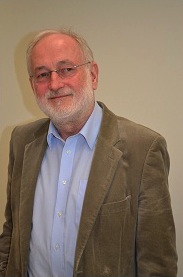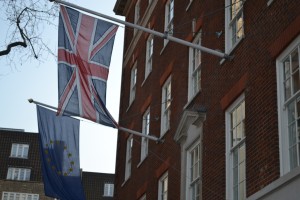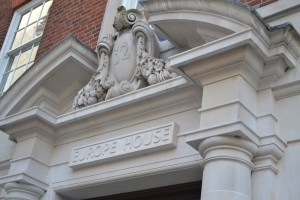 On a sunny afternoon at Smith Square’s Europe House, two Franco-British students met with the delightful Michael Shackleton. His welcoming and open-minded attitude made for a fascinating and agreeable interview where he expressed his insightful opinions on Franco- British relations and more… opinions rooted in his 31 years of experience in the European Parliament.
On a sunny afternoon at Smith Square’s Europe House, two Franco-British students met with the delightful Michael Shackleton. His welcoming and open-minded attitude made for a fascinating and agreeable interview where he expressed his insightful opinions on Franco- British relations and more… opinions rooted in his 31 years of experience in the European Parliament.
Can you briefly go through your education and your career?
I was born in Germany but came to live in Britain when I was very small. I was educated, went to school and university in Britain. But after university, I went as a “stagiaire” (translated into English normally as “in-service trainee”) to the European Commission. That was my first introduction to a “multilingual-multicultural” world in the sense that even though I knew Germany well, that was a family affair rather an opportunity to meet other people of my own age. I was initially in Belgium for six months but then returned to England to work at the Open University. I only came back to the European institutions eight years later when I decided that I didn’t necessarily want to remain a university academic for the rest of my life. Instead I decided to take my chance and work for the European Parliament in Luxembourg without any clear idea of what it would be like. My interview was in French and at the time my French was not so good: in fact, I was not one hundred percent sure what job I had been offered! At the time I thought “well, I will try it out and go for some years to gain experience”, but those “some years” expanded into 31 years. I worked initially in Luxembourg and subsequently in Belgium with a one-year interlude in the United States. I also spent some time in France to finish my PhD, taking advantage of a very French aspect of the “statut des fonctionnaires”, namely “congé de convenance personnelle“. My PhD was a comparison of Britain and France and their fishing policies. However, this was a brief interlude: most of myt career was spent in Luxembourg, Belgium and finally, the UK, where I became head of the Parliament office here in London in 2009. The London job was my last as I decided to leave early at the end of 2011. So now, I am “independent”, free to choose what I do: some lecturing, some writing but still on EU affairs.
From both a European and British point of view, how do you see France?
The reason why I did the PhD that I did was because I have always been fascinated by the difference between Britain and France, two countries whose histories are so very closely intertwined over centuries. French was, after all, spoken amongst the nobility in Britain for a number of centuries after 1066. And yet these two countries seem to have great difficulties in understanding and empathizing with each other.
As a student of politics, I was always interested in how the two countries dealt with similar problems in a very different way. My PhD was about fishing but it could have been about any other area of policy because it was designed to explain difference. In particular, I was interested in the idea of the State and why for French people the State (“Etat”) is such an important element in political life and is generally seen as a positive thing, something which structures political life and to which one turns for political solutions.
In Britain, the word “State” is not used in the same way; we don’t have the same sense of the “State” as the central organizing principle for the use of public power. We have less of a sense of the central institutions of government as being the guiding force around which political life should be organised; we like to think of governing in terms of the give and take between the plethora of interest groups in society that leads to an agreed outcome under the guidance of the government. It was for this reason that I have always been drawn to the description of France as a “state-led society” and Britain as a “society-led state”. I have always looked at the problems we have in common through this lens, this way of thinking, which reflects very different political philosophies. We may look more superficially like each other than we did but our ways of thinking remain very different. This is also why I asked to become a Franco-British Council member: the relationship between France and Britain is very special and particularly fascinating from my point of view.
How do you envisage the Franco British relations in the future, knowing that France might go through political change?

As I suggested there is always going to be a level of continuity in the relationship. Countries don’t change overnight. They have deep histories, which are reflected in the present. On the other hand, it is clear that the world is changing around us. Who would have thought that the British and French governments would sign the St Malo declaration and start moving to a closer integration of their defense capabilities? Some people in Britain see in such cooperation the possibility that France might have a finger on the UK nuclear button, even this is far from the truth. Such thinking reflects the fact that both countries are reluctant to admit that they are becoming smaller, less important in the world. There is a tendency to believe that we remain important because we each have a seat on the Security Council of the United Nations. For both countries, whatever the rhetoric, the real question is whether they should be looking to do more things together. We are inclined to say “we have to keep all our embassies, we have to keep our own defense system” but consider how the world is changing. In 1982 when Argentina invaded the Falklands it was possible for Britain to send enough ships to recover the islands. Now, though nobody actually believes Argentina is likely to invade again, if it did do so, it is not at all clear that Britain could stop them: its defence capability has declined significantly in the intervening 30 years. It is an illustration of how the two countries are becoming smaller: they can’t afford to act in the way they did. Hence the pressure to look at new ways of cooperating, not least through the European Union, a framework specifically designed to enable countries to gain by working together.
What is the difference between the Franco-British relations in the public space and your experience in the European Parliament?
I think the European Parliament is a remarkable place: I thoroughly enjoyed working there. Its fascination lies partly in the fact that nothing can be done if you only try to play the national card. No national group of MEPs, however large, is big enough to be able to impose its will on the rest of the institution. Equally, there is no political group in the Parliament which holds an overall majority. The largest party, the European People’s Party, still only holds about 280 out of 736 seats: they are thus a hundred away from having a majority. So you have to have political agreements across political groups and you have to have agreements across nationalities, if want a consensus broad enough to get a proposal through. The Parliament is a place which obliges its members to confront the way others think, something which is much less apparent in more traditional inter-governmental negotiations.
Beyond national and party disputes, do you think that there is a debate over values at the European Parliament : Liberal Europe vs Social Europe?
I have always taken the view of Simon Hix, Professor at LSE, that the European Union is growing up and becoming a place for political contestation between different sets of values. The interesting questions in the European Union are precisely the balance between a more liberal economic philosophy and a more socially inclined approach. The struggle between these two views is taking place all the time in the Parliament, though it is hard to see it from the outside because the Parliament itself is not very visible and is also a place where there is always strong pressure to find compromises that obscure differing views.
 As a European official, I was not in the Parliament to promote one vision of Europe, but rather to draw attention to different visions, thereby showing that the Parliament can represent a wide cross-section of European opinion, not just the views of governments. In such an institution, French and British MEPs can be drawn into alliance because of shared values. There is a tendency outside the institution to assume that national MEPs will vote together to defend a specific interest but more often than not they don’t.. Why? Because they have different values, values that can be held by people from diverse national backgrounds. It is this diversity of opinion and values which is crucial to the institution and makes it much more than a sounding board for 27 national positions.
As a European official, I was not in the Parliament to promote one vision of Europe, but rather to draw attention to different visions, thereby showing that the Parliament can represent a wide cross-section of European opinion, not just the views of governments. In such an institution, French and British MEPs can be drawn into alliance because of shared values. There is a tendency outside the institution to assume that national MEPs will vote together to defend a specific interest but more often than not they don’t.. Why? Because they have different values, values that can be held by people from diverse national backgrounds. It is this diversity of opinion and values which is crucial to the institution and makes it much more than a sounding board for 27 national positions.
Interviewed on 15 March 2012 in the Europe House, London
Franco-British Portrait Gallery
© Florian Bercault & Capucine Riom


